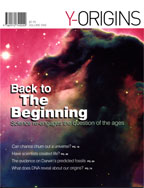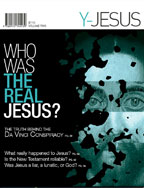Astronomy: A Fine-Tuned Universe
Cosmologist George Smoot said on ABC TV, “If you’re religious, it’s like looking at God.” The Nobel Prize winning scientist was referring to the discovery that our universe had a one-time beginning. His experiments from the COBE satellite had confirmed what scientists call the big bang theory. Decades earlier, Edwin Hubble had discovered that our universe is expanding. An expanding universe means if you go far enough back, there must have been a beginning.
Smoot's experiments proved that all matter, energy, space, and even time itself came into being at one point in time. Prior to that discovery, scientists committed to materialism were content to believe that the universe was self-existent, and didn't require someone to start it.
But if the universe had a beginning, then the logical question is “who---or what caused it?” Even though he is an agnostic, Smoot wrote of the obvious parallel that exists between the big bang and the Christian teaching of creation from nothing.
A beginning of all matter, energy, and time seems to point clearly to a creator. But some materialists argued that the universe might have begun with some kind of random quantum event that happened on its own. However, as scientists looked at the odds, they soon realized that a random explosion like the big bang could never have led to a universe compatible with life. Cosmologists, physicists, and astronomers all agree: the universe is exquisitely fine-tuned for life. This led many like astronomer George Greenstein to ask,
“Is it possible that suddenly, without intending to, we have stumbled upon the scientific proof of the existence of a Supreme Being?” George Greenstein
This discovery of the beginning of the universe and its precisely fine-tuned laws has set materialists on their heels. Even atheistic scientists realize that a random big bang could never have resulted in human life. In his number one best selling science book, A Brief History of Time, Stephen Hawking grapples with the implications of a finely-tuned universe:
“There must be religious overtones. But I think most scientists prefer to shy away from the religious side of it.” Stephen Hawking
Hawking further admits,
“It would be very difficult to explain why the universe should have begun in just this way, except as the act of a God who intended to create beings like us.” Stephen Hawking
But as a materialist, Hawking looks for scientific answers rather than religious ones. He and other materialists have tried to explain away intelligent design by proposing that ours is not the only universe, but perhaps one of billions that are both unseen and unknowable. If true, they reason we would not be so special after all---we simply would have been the one grand lottery winner of all those universes. This multiverse theory seems like something out of a Star Trek episode, and unlike good science, it is not based upon one shred of empirical evidence.
The multiverse theory has been branded by other scientists as pseudo science, an almost laughable diversion to explain away the logical inference of design. An article in Atlantic Monthly says as much.
“The multiverse idea rests on assumptions that would be laughed out of town if they came from a religious text.” Atlantic Monthly
But even though some materialists have tried to explain away fine tuning of the universe as mere luck, many have been more open to common sense. After carefully looking at the evidence and reversing his original view, the shocked agnostic astronomer Sir Fred Hoyle remarked:
“A common sense interpretation of the facts suggests that a superintellect has monkeyed with physics, as well as chemistry and biology, and that there are no blind forces worth speaking about in nature. The numbers one calculates from the facts seem to me so overwhelming as to put this conclusion almost beyond question.” Sir Fred Hoyle
Scientists like Hoyle have been stunned by the overwhelming odds against life occurring by unguided natural processes. Such odds are like purchasing one ticket for a hundred Power Ball lotteries, and being lucky enough to win them all. How likely is that---unless the outcome was fixed by someone who had control of the numbers? And that is exactly what has many scientists like Hoyle are thinking---that the numbers were fixed by a superintellect monkeying with nature’s laws.
Click to continue reading about the Origin of Life and Molecular Biology.
|




